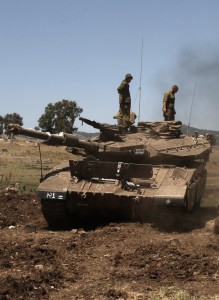Syria retakes Golan crossing after Qusayr triumph
QUNEITRA CROSSING—Syria’s army have recaptured the only Golan Heights crossing on the ceasefire line with Israel, in another setback for rebels a day after they were forced out of the strategic town of Qusayr.
Austria, meanwhile, said Thursday it was withdrawing its troops from a UN peacekeeping force on the Golan because of the deteriorating security.
Qusayr’s capture gives President Bashar al-Assad the upper hand if a US-Russian plan for the first direct peace talks with his opponents materialises, analysts say.
Russia said Syrian Foreign Minister Walid Muallem would lead a government delegation at the “Geneva 2” talks which have been delayed largely over opposition disputes about who will attend.
The rebels briefly took control of the Quneitra crossing, strategically and symbolically important for its proximity to Israeli forces and to Damascus, before being forced out.
Article continues after this advertisementAn AFP correspondent said he could see tanks inside the area after Assad’s troops moved back in Thursday.
Article continues after this advertisementBoth the Syrian Observatory for Human Rights and Israeli army radio said the rebel advance had included fierce fighting in nearby Quneitra town.
The clashes were very close to the headquarters of a UN peacekeeping force, prompting Austria to announce it was withdrawing its troops and throwing the mission into disarray.
Two peacekeepers, from India and the Philippines, suffered “minor injuries” in shelling, a UN peacekeeping spokesman said.
In Vienna, the government said the threat to Austrian soldiers “has reached an unacceptable level.”
Defense Minister Gerald Klug said the withdrawal would take between two and four weeks and could begin as soon as Tuesday.
Neutral Austria has been part of the UN Disengagement Observer Force in the Golan since its inception in 1974 and is currently one of the biggest UNDOF contributors, with some 380 troops.
The UN peacekeeping force’s numbers already dropped to around 900 in March after Croatia became the latest country to withdraw its soldiers, following similar moves by Canada and Japan.
UN leaders held emergency talks on replacing the Austrian troops.
UN chief Ban Ki-moon, through his spokesman, expressed concern “about the potential consequences of such a withdrawal on the peacekeeping operation and also on regional security”.
The Quneitra crossing, the only direct passage between Israel and Syria, is used almost exclusively by Druze residents of the Golan who are allowed to cross to study, work or get married.
Israel seized a large section of the plateau from Syria in the 1967 Six-Day War and annexed it in 1981, a move never recognized internationally.
Thursday’s flareup prompted Israel to reinforce its military presence on the plateau, Israeli public radio said.
The developments came as soldiers hunting rebels who fled from Qusayr fired missiles at Eastern Bweida about 14 kilometers (nine miles) away, the Syrian Observatory for Human Rights said.
Qusayr, just 10 kilometers from Lebanon, was once home to more than 25,000 people.
But thousands fled during the blistering 17-day regime onslaught, led by fighters from the Lebanese Shiite movement Hezbollah.
“Qusayr is completely destroyed, and totally deserted,” Rami Abdel Rahman, the director of Syria’s human rights observatory, told AFP.
The regime “has called on Qusayr’s residents to return home, but there is nothing but ruins. How are they supposed to return?”
Hours after Qusayr fell, at least five rockets fired from Syria hit the eastern Lebanese city of Baalbek, a Hezbollah stronghold. Two people were hurt.
In northern Lebanon, fierce clashes raged in the center of the port city of Tripoli on Thursday killing one person and wounding seven, a security official said, in the latest Syria-related violence.
The fighting came as Paris said the international community must respond to test results from both French and British laboratories confirming the use of banned nerve agent sarin in Syria’s war.
US State Department spokeswoman Jen Pseki said Thursday that Washington had received and was evaluating the information, which it did not intend to “evaluate or litigate in public”.
Russian, US and UN diplomats on Wednesday admitted the widely anticipated “Geneva 2” peace conference would not take place as planned this month.
A date has still to be fixed for the talks on the 26-month conflict, which is estimated to have killed more than 94,000 people.
The head of the Russian FSB security service, Alexander Bortnikov, told a security forum on Thursday some 200 Russian Islamists are fighting in Syria for Al-Qaeda.
On the humanitarian front, the European Union said it will give another 400 million euros ($530 million) in aid for Syria and neighboring nations to cope with swelling refugee numbers.
The EU has already provided some 840 million euros.
Meanwhile top US Republican senator John McCain, who visited Syria last week, said The United States must deepen its engagement in the country by equipping the rebels or setting up a safe zone to protect the opposition.
Elsewhere, the elderly father of Syrian Deputy Foreign Minister Faisal Muqdad was freed on Thursday, nearly three weeks after his abduction by gunmen, a security source told AFP.
